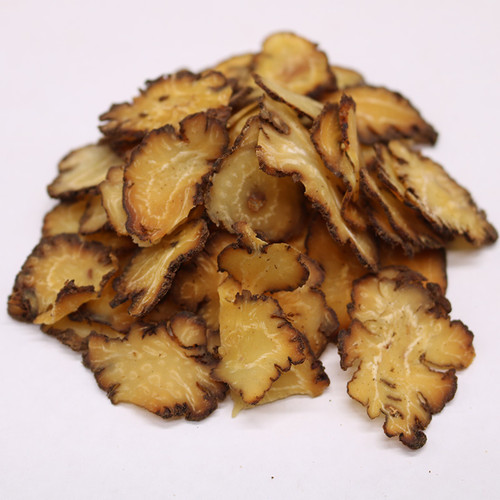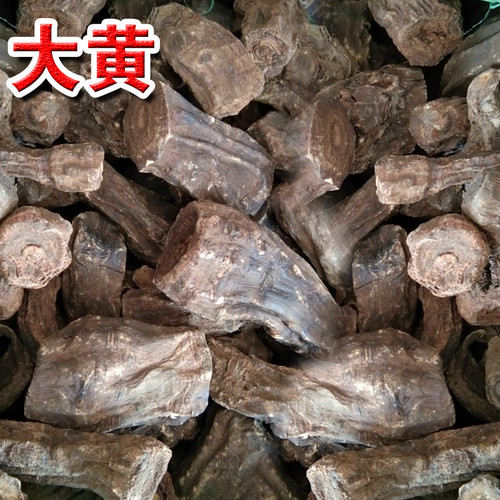Product Overview
Parts used: Dried rhizome
TCM category: Herbs that invigorate the Blood
TCM nature: Warm
TCM taste(s): Pungent
Meridian affinity: Gall bladder Liver Pericardium
Scientific name: Ligusticum chuanxiong
Use of szechuan lovage roots (Chuan Xiong) in TCM
Please note that you should never self-prescribe TCM ingredients. A TCM ingredient is almost never eaten on its own but as part of a formula containing several ingredients that act together. Please consult a professional TCM practitionner, they will be best able to guide you.
Preparation: Remove impurities and smaller roots, wash and dry.
Dosage: 3 - 9 grams
Main actions according to TCM*: Regulates and moves the Blood. Relieves Wind-Cold and pain. Circulates the Qi in the Upper Burner, relieving headaches.
Primary conditions or symptoms for which szechuan lovage roots may be prescribed by TCM doctors*: Irregular menstruation Amenorrhea Dysmenorrhea Chest pain Headache Arthralgia
Contraindications*: Not to be used for headaches that occur because of Deficiency of Yin or from raising Liver Yang; it should not be used when there is abnormal bleeding or during pregnancy.
Common TCM formulas in which szechuan lovage roots are used*:
For painful menstruation combine szechuan lovage roots with dong quai (Dang Gui) and lindera roots (Wu Yao).
For joint pains caused by Blood Stagnation combine szechuan lovage roots with dong quai (Dang Gui), achyranthes roots (Niu Xi) and red sage roots (Dan Shen).
For dysmenorrhea caused by Qi and Blood Stagnation combine szechuan lovage roots with dong quai (Dang Gui), coco-grass rhizomes (Xiang Fu) and turmeric tubers (Yu Jin).
For Blood tonification combine szechuan lovage roots with dong quai (Dang Gui), prepared rehmannia (Shu Di huang) and white peony roots (Bai Shao).
For conditions such as anemia, weakness, tiredness, irregular menses caused by exhaustion or postpartum recovery combine szechuan lovage roots with ginseng (Ren Shen), atractylodes rhizomes (Bai Shu), poria-cocos mushrooms (Fu Ling), liquorice (Gan Cao), dong quai (Dang Gui), prepared rehmannia (Shu Di huang), white peony roots (Bai Shao), fresh ginger (Sheng Jiang) and jujube dates (Da Zao).
For migraine headaches combine szechuan lovage roots with gastrodia rhizomes (Tian Ma) and achyranthes roots (Niu Xi).
For joint pains caused by Wind-Damp obstruction combine szechuan lovage roots with gastrodia rhizomes (Tian Ma) and frankincense (Ru Xiang).
For numbness of the limbs and extremities combine szechuan lovage roots with gastrodia rhizomes (Tian Ma), dong quai (Dang Gui) and achyranthes roots (Niu Xi).
For Wind-heat headache combine szechuan lovage roots with angelica roots (Bai Zhi) and chrysanthemum flowers (Ju Hua).
For irregular menstruation combine szechuan lovage roots with vaccaria seeds (Wang Bu Liu Xing), dong quai (Dang Gui), peach kernels (Tao Ren) and safflowers (Hong Hua).
For heavy menstrual bleeding or strong bleeding postpartum combine szechuan lovage roots with tienchi ginseng (San Qi), dong quai (Dang Gui), white peony roots (Bai Shao) and unprepared rehmannia (Di Huang).
Key TCM concepts behind szechuan lovage roots (Chuan Xiong)'s properties
In Traditional Chinese Medicine (TCM), szechuan lovage roots are plants that belong to the 'Herbs that invigorate the Blood' category. Like the name indicates these herbs tend to stimulate the Blood flow. In TCM they're used to help the circulation of Blood in cardiovascular conditions or menstrual irregularities as well as to treat acute pains caused by Blood Stagnation. They can also be used to treat Blood Stasis in the case of certain tumors, cysts and hardened clots.
Furthermore szechuan lovage roots are plants that are Warm in nature. This means that szechuan lovage roots tend to help people who have too much "cold" in their body, although with less effect than a plant that would be Hot in nature. Balance between Yin and Yang is a key health concept in TCM. Those who have too much cold in their body are said to either have a Yin excess (because Yin is Cold in nature) or a Yang deficiency (Yang is Hot in Nature). Depending on your condition szechuan lovage roots can help restore a harmonious balance between Yin and Yang.
Szechuan lovage roots also taste Pungent. The so-called "five elements" theory in Chinese Medicine states that the taste of TCM ingredients is a key determinant of their action in the body. Pungent ingredients like szechuan lovage roots tend to promote the circulations of Qi and body fluids. That's why for instance someone tends to sweat a lot when they eat spicy/pungent food.
The tastes of ingredients in TCM also determine what organs and meridians they target. As such szechuan lovage roots are thought to target the Gallbladder, the Liver and the Pericardium. Similar to modern medicine, in TCM the Gall Bladder stores and releases bile produced by the Liver. It also controls the emotion of decisiveness. The Liver on the other hand is often referred as the body's "general" because it is in charge of regulating the movements of Qi and body fluids. It also takes a leading role in balancing our emotions. The Pericardium is also called the "heart protector". It is the first line of defence for the Heart against external pathogenic influences.







